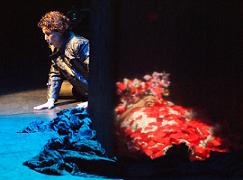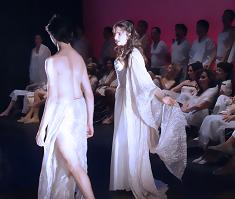
If he died in 1787, six years before Marie-Antoinette who favored him as her composer, Christoph Willibald Ritter von Gluck belongs to the musicians of the old regime whose works have managed to traverse the revolution. However, this came at the price of some adjustments. In his most famous work, Orpheus & Eurydice, the voice of the titular role has, with the help of Berlioz’s version, shifted from a counter-tenor to that of a mezzo-soprano. Marie-Ange Todorovitch enchanted her audience in this role during the premiere, on Friday, April 24, at the Opera of Nice. Far from that boring “Gluckian tragic declamation” once mentioned by Marc Minkowski, the extensive and stable vocal range of this lyrical artist with impeccable diction, her vocal ease filled with beautifully deep and vibrant tones immediately draws us away from the underworld where she nevertheless goes to seek her Eurydice. She is equally compelling with her very convincing dramatic performance. In her initiatory journey, she is guided by Love, performed by Sophie Haudebourg, a beautiful voice whose high notes are unfortunately too metallic. She eventually finds her Eurydice sung by Brigitte Hool, a soprano whose interpretation of Agilea in the Teseo of March 2007 was already appreciated by the Nice audience. She still moves the audience with the quality of her clear and precise high notes, despite some passages where her diction proved inexplicably deficient.
The complete spectacle of Orpheus & Eurydice did not disappoint with the magnificent performance of the choruses and ballets of the Opera. Particular mention goes to the movements of Andres Heras Frutos and those of Paula de Castro, accompanied by Christine Nonelli and José Ramirez del Toro. But the highest praise principally goes to the artistic team from the Oper Halle: the suggestive power of the staging and choreography by Ralf Rossa, as well as the impressive effects of the minimalist sets and the superb nuanced lighting by Matthias Hönig. Dynamical intensity of the action and perfect symbiosis of bodies with music are credited to the former, with a striking impression of scenic volume and subtle evocation of the fine lines between love and death to the latter. This beautiful work is skillfully complemented by the costumes of Wiebke Horn.
The musical direction led by the young conductor Benjamin Pionnier meanwhile leaves a somewhat mixed impression: perceivable and commendable efforts of harmony with the Nice Philharmonic Orchestra and the stage are not exhaustive in addressing certain heaviness in the opening as well as questions about questionable choices of tempos for certain parts of the score. The only reservation for an overall very successful performance.



